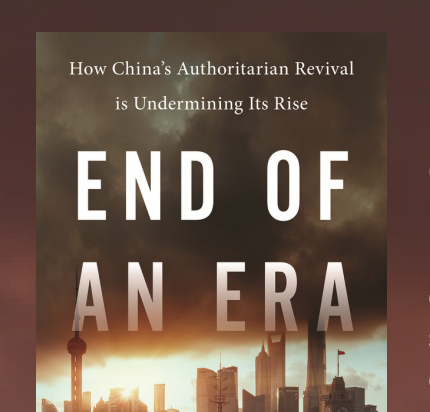
Dr. Minzner traced the political history of the People’s Republic of China through three eras: Pre-Reform, Reform, and the current Post-Reform. He began by briefly comparing the norms in each era to demonstrate the political, social, and economic trends that indicate a shift from the Reform Era toward the Post-Reform Era. To define the Post-Reform era, he described the “erosions” of Reform Era norms marked in particular by contrast of former leaders with Xi Jinping’s rule, but that include shifts in a variety of areas.
The trends that Minzner identified as marking a shift included a slowing of the Reform Era’s rapid economic growth, a turn away from openness to outside ideologies and a consequent turn toward China’s own history for cultural guidance, and political norms, such as a resurgence of assertion of the power of the Chinese Communist Party, which existed through the Reform Era.
Dr. Minzner gave multiple examples of political changes in the Post-Reform Era. He contrasted current trends with the Reform Era, demonstrating the increased tendency to exalt Xi Jinping and to associate him personally with the Chinese Communist Party, the failure to designate a successor for Xi Jinping, the targeting of former government officials for investigation and the greatly increased reach of disciplinary committees.
He also gave the example of a renewed interest in China’s own culture and history, contrasted to the relative openness to outside ideology of the Reform Era, and explained that it also signifies a resistance to these outside influences which are emblematic of the Post-Reform Era. Minzer also argued that this turn towards Chinese history and culture has simultaneously led to tension with many marginalized groups who are most excluded from a Han-centric Chinese identity, highlighting and possibly exacerbating existing fractures within the PRC.
 Dr. Minzner concluded by saying that the erosion of Reform Era norms are of particular concern due to the relative newness of the reforms themselves. While the Reform Era was shaped by leaders who witnessed and experienced the Cultural Revolution, the Post-Reform leaders have not. In the context of Chinese history these changes point to a possible reversion back to “older methods to make change happen,” especially since, Minzner argues, China did not build “alternative institutions” during the Reform Era.
Dr. Minzner concluded by saying that the erosion of Reform Era norms are of particular concern due to the relative newness of the reforms themselves. While the Reform Era was shaped by leaders who witnessed and experienced the Cultural Revolution, the Post-Reform leaders have not. In the context of Chinese history these changes point to a possible reversion back to “older methods to make change happen,” especially since, Minzner argues, China did not build “alternative institutions” during the Reform Era.
Bio
Carl Minzner is an expert in Chinese law and governance. He has written extensively on these topics in both academic journals and the popular press, including op-eds appearing in the New York Times, Wall Street Journal, Los Angeles Times, and Christian Science Monitor. He is the author of End of an Era: How China’s Authoritarian Revival is Undermining its Rise (Oxford University Press, 2018).

